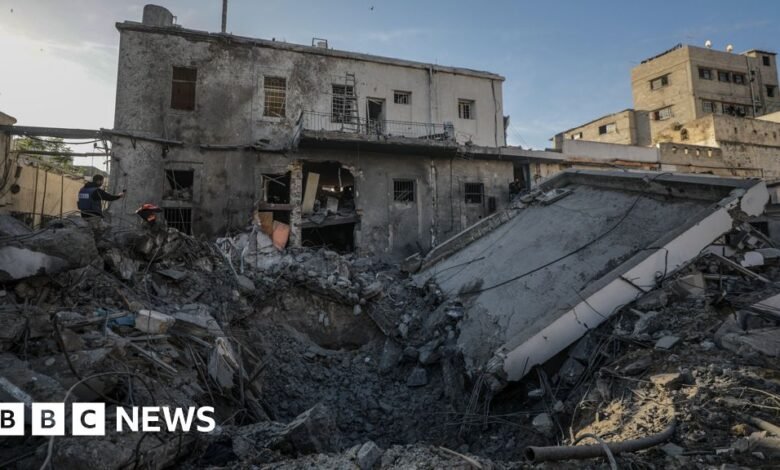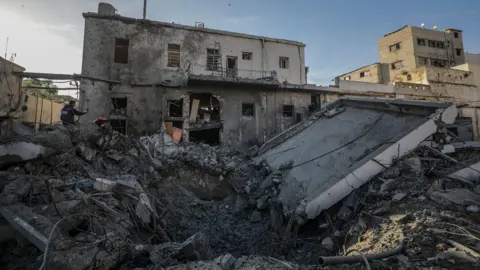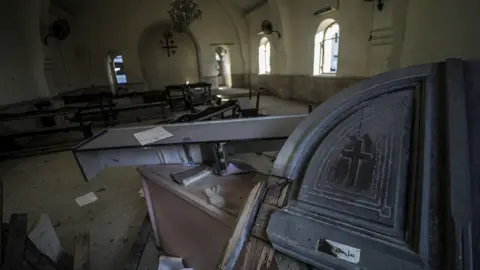Conditions at Gaza hospitals ‘beyond description’, WHO says

 EPA
EPAThe World Health Organization has said conditions at hospitals in Gaza are “beyond description”, after a major facility was put out of service by an Israeli air strike.
Spokeswoman Dr Margaret Harris told the BBC it was seeing “attack after attack” on hospitals and healthcare workers, and medical supplies were critically low due to Israel’s blockade of the territory.
On Sunday, staff at al-Ahli hospital in Gaza City said an Israeli strike had destroyed its laboratory and damaged its emergency room. They did not report any direct casualties, but said a child died due to disruption of care.
The Israeli military said it hit a “command-and-control centre” used by Hamas to plan attacks.
The hospital is run by the Church of England, whose bishops said they shared “grief, sorrow and outrage” with Palestinians over the attack and called on Israel to provide evidence to support its claim.
A ceasefire in Gaza ended when Israel resumed its air and ground campaign four weeks ago, saying that military pressure would force Hamas to release the hostages it is still holding.
Al-Ahli hospital was struck by two missiles around midnight on Sunday – the fifth time it has been hit since the beginning of the war.
According to the Anglican Diocese of Jerusalem, the two-storey genetic laboratory was demolished and the pharmacy and emergency department buildings were damaged. Surrounding buildings were also damaged, including St Philip’s Church.
The diocese said the Israel military gave a 20-minute warning to hospital staff and patients to evacuate before the attack.
There were no casualties as a result of the strike, but one child who had previously suffered a head injury died as a result of the rushed evacuation process, it added.
Later, WHO Director General Dr Tedros Adhanom Ghebreyesus said the UN agency had been told by al-Ahli’s director that the emergency room, laboratory, emergency room X-ray machines, and the pharmacy were “destroyed”.
The hospital was forced to move 50 patients to other hospitals, but 40 patients in a critical condition could not be moved, he added.
“Hospitals are protected under international humanitarian law. Attacks on health care must stop. Once again we repeat: patients, health workers and hospitals must be protected.”
The Israeli foreign ministry said it was a “precise strike on a single building that was used by Hamas as a terror command and control centre” and where there was “no medical activity take place”.
It also stressed that an “early warning” was issued, and that the strike was “carried out while avoiding further damage to the hospital compound, which remained operational for continued medical treatment”.
Hamas condemned the attack as a “savage crime” and rejected the claim that it was using the facility for military purposes.
On Monday, the Church of England’s House of Bishops said in a statement they were “dismayed that hospitals have become battlegrounds in Gaza” and that Israel had “yet to provide clear and compelling evidence to substantiate its claim” that the hospital was being used by Hamas.
“Against that backdrop, we call for an independent, thorough and transparent investigation into this attack as well as the alleged misuse of the hospital.”
The bishops also said that “the extremely limited time given to staff and patients to evacuate the hospital was a further assault on fundamental human rights and basic human dignity”.
WHO representative Dr Rik Peeperkorn meanwhile told the BBC that al-Ahli was now unable to receive new patients pending repairs, and that this would “heavily impact trauma patients”.
“Al-Ahli was a key trauma hospital north of Wadi Gaza. It is the hospital with the only functional CT scanner north of Wadi Gaza,” he said, referring to the valley that effectively divides the territory in two because it is an Israeli-designated “no-go” area.
The charity Medical Aid for Palestinians also quoted an orthopaedic surgeon at al-Ahli as saying that the level of care the hospital could provide to the 40 remaining patients was “quite similar to that of a hostel”.
“We are unable to perform any surgical procedures, as these patients require laboratory diagnostics, pharmacy support, and emergency referrals in case of complications – all of which have ceased entirely due to the recent attack,” Dr Ahmed al-Shurafa said.
 EPA
EPAThe ICRC’s head of sub-delegation in Gaza, Adrian Zimmermann, also warned that the wider shortage of medical supplies “puts the life and the wellbeing of Gazans who require healthcare services at risk”.
Dr Peeperkorn said they were running critically low because Israel had not allowed in any deliveries of humanitarian aid for more than six weeks.
He added that the WHO had stockpiled some supplies in its warehouses during the recent ceasefire, but that the Israeli military was not facilitating transfers between northern and southern Gaza.
“Last week, we had a discussion with one of the medical specialists at al-Ahli. He was telling us that they had to use the same surgical gowns and the same surgical gloves for various operations, while we have surgical gloves and gowns in our warehouse in Deir al-Balah [south of Wadi Gaza],” he recalled. “We want to bring them, but we are not facilitated.”
The Israeli military launched a campaign to destroy Hamas in response to an unprecedented cross-border attack on 7 October 2023, in which about 1,200 people were killed and 251 others were taken hostage.
More than 50,980 people have been killed in Gaza since then, according to the territory’s Hamas-run health ministry.
A ceasefire deal that began in January and lasted two months saw Hamas release 33 Israeli hostages – eight of them dead – and five Thai hostages in exchange for about 1,900 Palestinian prisoners and a surge in humanitarian aid entering Gaza.
Israel resumed its offensive on 18 March, blaming Hamas’s refusal to accept a proposal for an extension of the agreement’s first phase and the release of more of the 59 hostages it is still holding, up to 24 of whom are believed to be alive.
Hamas accused Israel of violating the original deal, according to which there would be a second phase where all the remaining living hostages would be handed over and the war brought to a permanent end.
On Monday, a Hamas delegation led by the group’s chief negotiator left Cairo without making any progress in talks with Egyptian mediators aimed at reaching a new ceasefire agreement, a senior Palestinian official familiar with the talks told the BBC.
“No breakthrough was achieved due to Israel’s refusal to commit to ending the war and withdrawing from the Gaza Strip,” the official said.
“Hamas showed flexibility, regarding the number of hostages to be released in order to make progress. But Israel wants the hostages back without ending the war,” he claimed.
Israel has said it is waiting for a response to its latest proposal, sent at the end of last week.
It is understood to have reduced slightly the number of hostages it is demanding should be released in exchange for an extension of the truce and the entry of humanitarian aid.
A group of hostages’ families, known as the Tikvah Forum, said on Monday that the parents of Eitan Mor had been told by Prime Minister Benjamin Netanyahu that the government was working on a deal that would see 10 hostages freed – down from 11 or 12.
Source link




